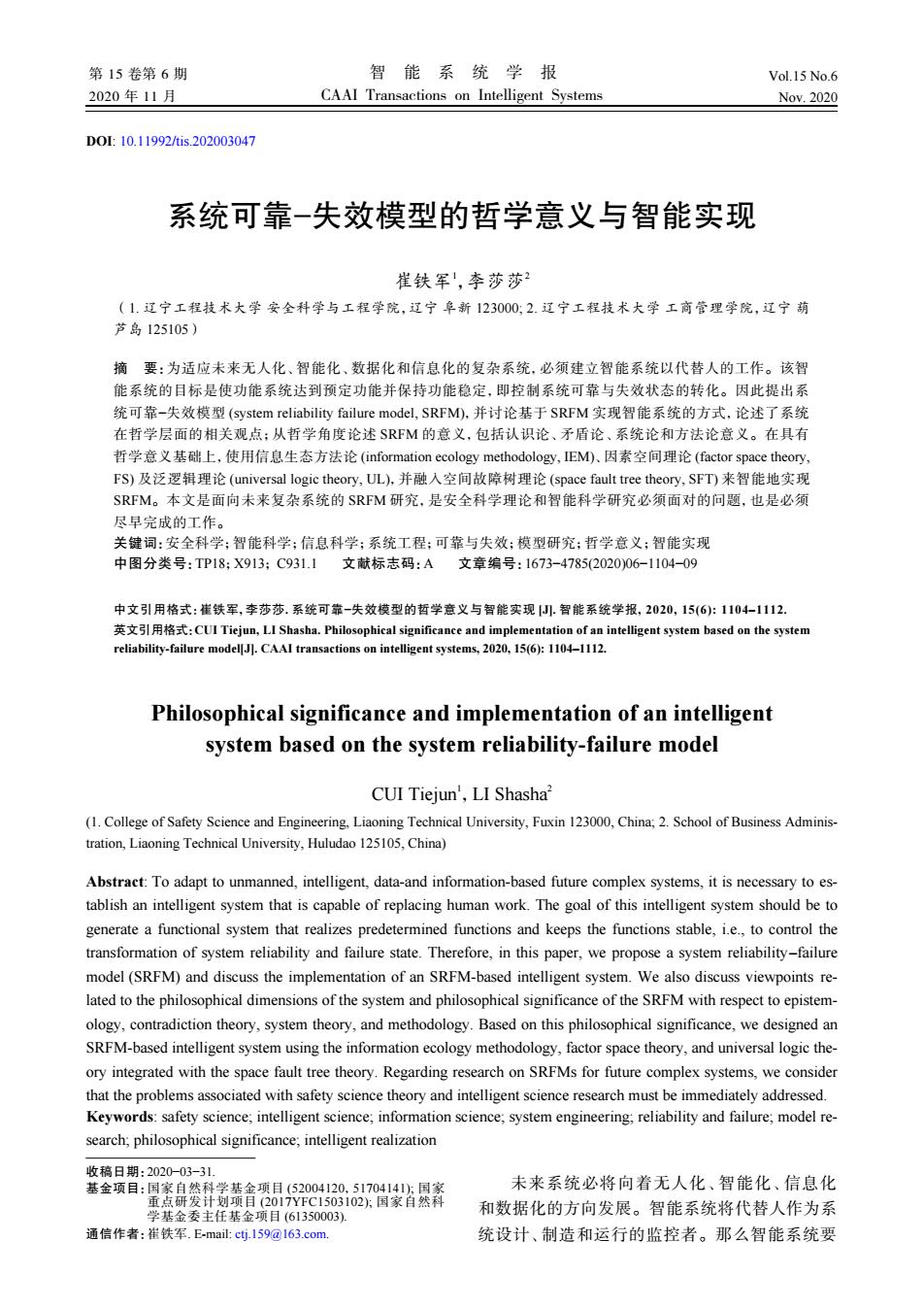正在加载图片...

第15卷第6期 智能系统学报 Vol.15 No.6 2020年11月 CAAI Transactions on Intelligent Systems Nov.2020 D0L:10.11992tis.202003047 系统可靠-失效模型的哲学意义与智能实现 崔铁军1,李莎莎2 (1.辽宁工程技术大学安全科学与工程学院,辽宁阜新123000,2.辽宁工程技术大学工商管理学院,辽宁葫 芦岛125105) 摘要:为适应未来无人化、智能化、数据化和信息化的复杂系统,必须建立智能系统以代替人的工作。该智 能系统的目标是使功能系统达到预定功能并保持功能稳定,即控制系统可靠与失效状态的转化。因此提出系 统可靠-失效模型(system reliability failure model,SRFM),并讨论基于SRFM实现智能系统的方式,论述了系统 在哲学层面的相关观点:从哲学角度论述SRFM的意义,包括认识论、矛盾论、系统论和方法论意义。在具有 哲学意义基础上,使用信息生态方法论(information ecology methodology,EM)、因素空间理论(factor space theory, FS)及泛逻辑理论(universal logic theory,UL),并融入空间故障树理论(space fault tree theory,SFT)来智能地实现 SRFM。本文是面向未来复杂系统的SRFM研究,是安全科学理论和智能科学研究必须面对的问题,也是必须 尽早完成的工作。 关键词:安全科学;智能科学;信息科学;系统工程:可靠与失效;模型研究:哲学意义;智能实现 中图分类号:TP18;X913:C931.1文献标志码:A文章编号:1673-4785(2020)06-1104-09 中文引用格式:崔铁军,李莎莎.系统可靠-失效模型的哲学意义与智能实现J.智能系统学报,2020,15(6):11041112. 英文引用格式:CUI Tiejun,LI Shasha.Philosophical significance and implementation of an intelligent system based on the system reliability-failure model[J.CAAI transactions on intelligent systems,2020,15(6):1104-1112. Philosophical significance and implementation of an intelligent system based on the system reliability-failure model CUI Tiejun',LI Shasha' (1.College of Safety Science and Engineering,Liaoning Technical University,Fuxin 123000,China;2.School of Business Adminis- tration,Liaoning Technical University,Huludao 125105,China) Abstract:To adapt to unmanned,intelligent,data-and information-based future complex systems,it is necessary to es- tablish an intelligent system that is capable of replacing human work.The goal of this intelligent system should be to generate a functional system that realizes predetermined functions and keeps the functions stable,i.e.,to control the transformation of system reliability and failure state.Therefore,in this paper,we propose a system reliability-failure model(SRFM)and discuss the implementation of an SRFM-based intelligent system.We also discuss viewpoints re- lated to the philosophical dimensions of the system and philosophical significance of the SRFM with respect to epistem- ology,contradiction theory,system theory,and methodology.Based on this philosophical significance,we designed an SRFM-based intelligent system using the information ecology methodology,factor space theory,and universal logic the- ory integrated with the space fault tree theory.Regarding research on SRFMs for future complex systems,we consider that the problems associated with safety science theory and intelligent science research must be immediately addressed. Keywords:safety science;intelligent science;information science;system engineering;reliability and failure;model re- search;philosophical significance;intelligent realization 收稿日期:2020-03-31. 基金项目:国家自然科学基金项目(52004120,51704141):国家 未来系统必将向着无人化、智能化、信息化 重点研发计划项目(2017YFC1503102);国家自然科 学基金委主任基金项目(61350003). 和数据化的方向发展。智能系统将代替人作为系 通信作者:崔铁军.E-mail:ctj.159@163.com. 统设计、制造和运行的监控者。那么智能系统要DOI: 10.11992/tis.202003047 系统可靠−失效模型的哲学意义与智能实现 崔铁军1 ,李莎莎2 (1. 辽宁工程技术大学 安全科学与工程学院,辽宁 阜新 123000; 2. 辽宁工程技术大学 工商管理学院,辽宁 葫 芦岛 125105) 摘 要:为适应未来无人化、智能化、数据化和信息化的复杂系统,必须建立智能系统以代替人的工作。该智 能系统的目标是使功能系统达到预定功能并保持功能稳定,即控制系统可靠与失效状态的转化。因此提出系 统可靠−失效模型 (system reliability failure model, SRFM),并讨论基于 SRFM 实现智能系统的方式,论述了系统 在哲学层面的相关观点;从哲学角度论述 SRFM 的意义,包括认识论、矛盾论、系统论和方法论意义。在具有 哲学意义基础上,使用信息生态方法论 (information ecology methodology, IEM)、因素空间理论 (factor space theory, FS) 及泛逻辑理论 (universal logic theory, UL),并融入空间故障树理论 (space fault tree theory, SFT) 来智能地实现 SRFM。本文是面向未来复杂系统的 SRFM 研究,是安全科学理论和智能科学研究必须面对的问题,也是必须 尽早完成的工作。 关键词:安全科学;智能科学;信息科学;系统工程;可靠与失效;模型研究;哲学意义;智能实现 中图分类号:TP18;X913; C931.1 文献标志码:A 文章编号:1673−4785(2020)06−1104−09 中文引用格式:崔铁军, 李莎莎. 系统可靠−失效模型的哲学意义与智能实现 [J]. 智能系统学报, 2020, 15(6): 1104–1112. 英文引用格式:CUI Tiejun, LI Shasha. Philosophical significance and implementation of an intelligent system based on the system reliability-failure model[J]. CAAI transactions on intelligent systems, 2020, 15(6): 1104–1112. Philosophical significance and implementation of an intelligent system based on the system reliability-failure model CUI Tiejun1 ,LI Shasha2 (1. College of Safety Science and Engineering, Liaoning Technical University, Fuxin 123000, China; 2. School of Business Administration, Liaoning Technical University, Huludao 125105, China) Abstract: To adapt to unmanned, intelligent, data-and information-based future complex systems, it is necessary to establish an intelligent system that is capable of replacing human work. The goal of this intelligent system should be to generate a functional system that realizes predetermined functions and keeps the functions stable, i.e., to control the transformation of system reliability and failure state. Therefore, in this paper, we propose a system reliability–failure model (SRFM) and discuss the implementation of an SRFM-based intelligent system. We also discuss viewpoints related to the philosophical dimensions of the system and philosophical significance of the SRFM with respect to epistemology, contradiction theory, system theory, and methodology. Based on this philosophical significance, we designed an SRFM-based intelligent system using the information ecology methodology, factor space theory, and universal logic theory integrated with the space fault tree theory. Regarding research on SRFMs for future complex systems, we consider that the problems associated with safety science theory and intelligent science research must be immediately addressed. Keywords: safety science; intelligent science; information science; system engineering; reliability and failure; model research; philosophical significance; intelligent realization 未来系统必将向着无人化、智能化、信息化 和数据化的方向发展。智能系统将代替人作为系 统设计、制造和运行的监控者。那么智能系统要 收稿日期:2020−03−31. 基金项目:国家自然科学基金项目 (52004120,51704141); 国家 重点研发计划项目 (2017YFC1503102); 国家自然科 学基金委主任基金项目 (61350003). 通信作者:崔铁军. E-mail: ctj.159@163.com. 第 15 卷第 6 期 智 能 系 统 学 报 Vol.15 No.6 2020 年 11 月 CAAI Transactions on Intelligent Systems Nov. 2020